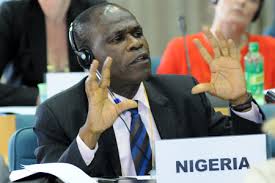Nigerians have been urged to ensure compliance with relevant environmental statutes and regulations in a bid to protect our environment from further harm and degradation.

Director-General, National Environmental Standard & Regulation Enforcement Agency (NESREA), Dr. Lawrence Anukam, stated this in his speech at the 6th Environment Outreach Magazine Public Lecture which took place at the Nigerian Institute for International Affairs (NIIA) in Lagos recently.
He said that the degeneration of the environment has reached very frightening levels and the earlier the nation begins to put a stop or reduce this dangerous trend, the better for us all.
He described NESREA as the government agency saddled with the responsibilities of enforcing compliance with environmental laws, regulations and guidelines, adding that the agency has been doing all it can to ensure that its mandate is carried out to the letter. He acknowledged that funding is a major challenge for the agency but, with the support of all Nigerians, the agency will still achieve its objectives.
Also speaking, the Chairman of the occasion, Mr. Desmond Majekodunmi, condemned the negative actions of Nigerians towards the environment. “God has given us all the natural resources we see around and it is therefore our sacred duty to protect and utilise them for His glory,” he said, even as he urged all Nigerians to continue to protect the environment and save the natural forests from further unwanton destruction.
He drew attention to a recent publication in London on the warming of the earth’s surface and the dangers posed to the world as a result of the uncontrolled felling of trees and our inability to keep pace with reforestation of the environment. He tasked all participants at the lecture to take the message of the Lecture seriously and ensure that they apply the lessons learnt after the event.
Also speaking at the event, the Executive Secretary of the Nigerian Content Monitoring and Development Board, Denzil Kentebe, represented by the Director, Planning, Research and Statistics, Mr. Patrick Obah, said that his organisation will work with the Environment Outreach Magazine to carry out some environmental and sustainable development initiatives for the good of the country and the Niger Delta in particular.
Host of the event and Publisher of the Environment Outreach Magazine, Chief Noble Akenge, described the theme of the Lecture, which is “Redefining Nigeria’s Environmental Agenda: Imperatives for Compliance Monitoring and Enforcement” as very apt in view of the poor or negative attitude of Nigerians towards obeying the law especially environmental laws and regulations.
He also stated that the objective of the magazine is to bring to the public domain the problems of the environment and how efforts are being made to solve them. He further said that, during the annual lecture, the magazine also identify some persons and institutions who have distinguished themselves in the service of the environment and honour them.
Chief Akenge also called on President Muhammadu Buhari to give environmental issues the attention it deserves. He also urged states and local government councils to begin to cooperate with the Federal Government and also put in place strategies to tackle the numerous environmental problems facing our nation.
He stated that the magazine would continue to advocate for a better environment in the country until a considerable level of improvement in the sustainable management and protection of the environment has been achieved.
Some of the Environmental Award recipients include Dr. Alex Thomopulos, Chief Operating Officer of the Guardian Newspapers Limited; Dr. Lawrence Anukam, DG, NESREA; Professor Clifford S. Teme, former President of the Nigerian Mining and Geosciences Society; Dr. Mrs. Comfort Maduemezia, Chief Consultant at Enville Environmental Consultants, Lagos; Ms. Dorothy Bassey, Head of Public Affairs, DPR, Lagos; Dr. Eugene Itua of MDS Limited, Lagos; Stakeholders Democracy Network and Jawura Environmental Consultants, Lagos among others.
The occasion was attended by top government functionaries; environmentalists; members of the academia; members of the diplomatic corps; the organised private sector; NGOs, students and members of the general public.
